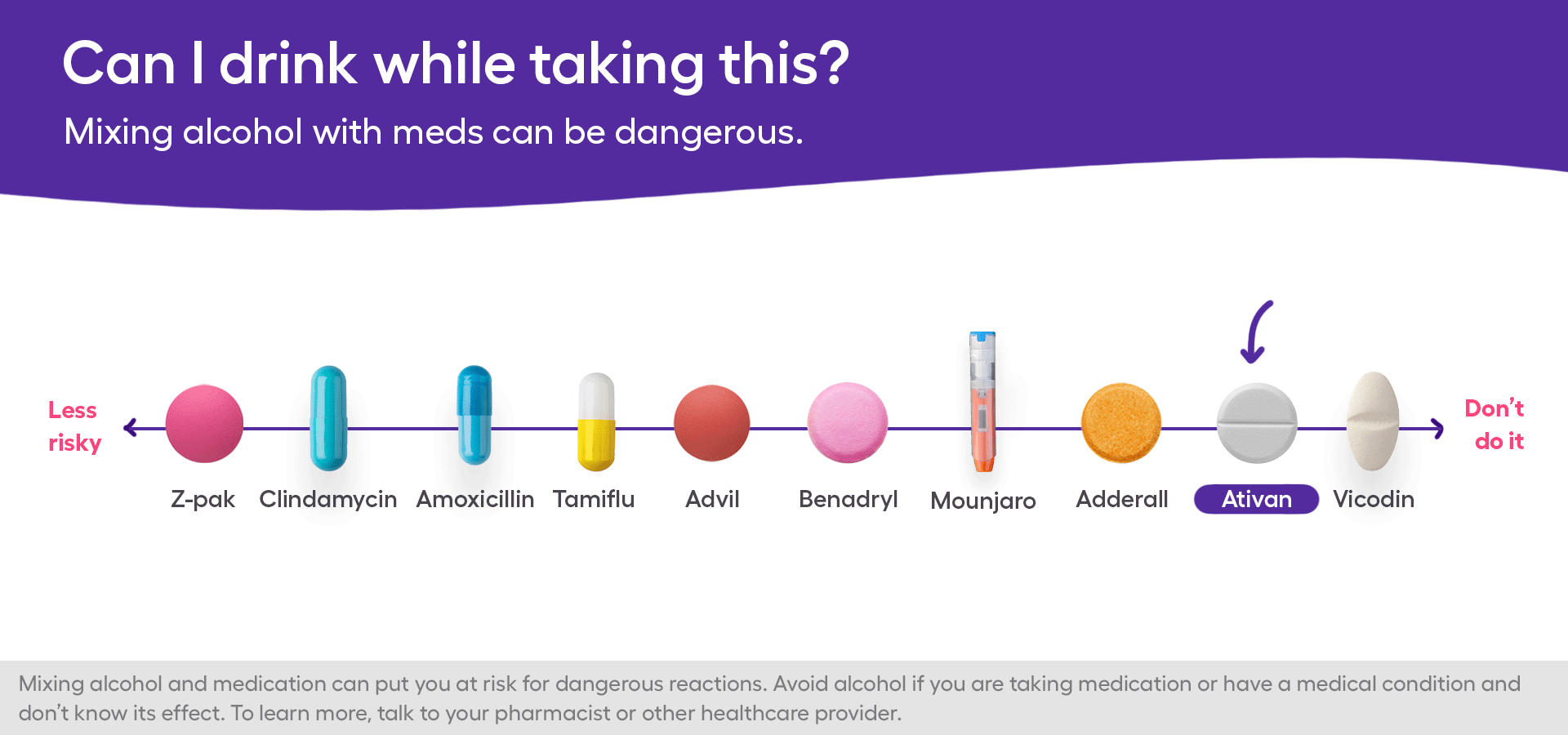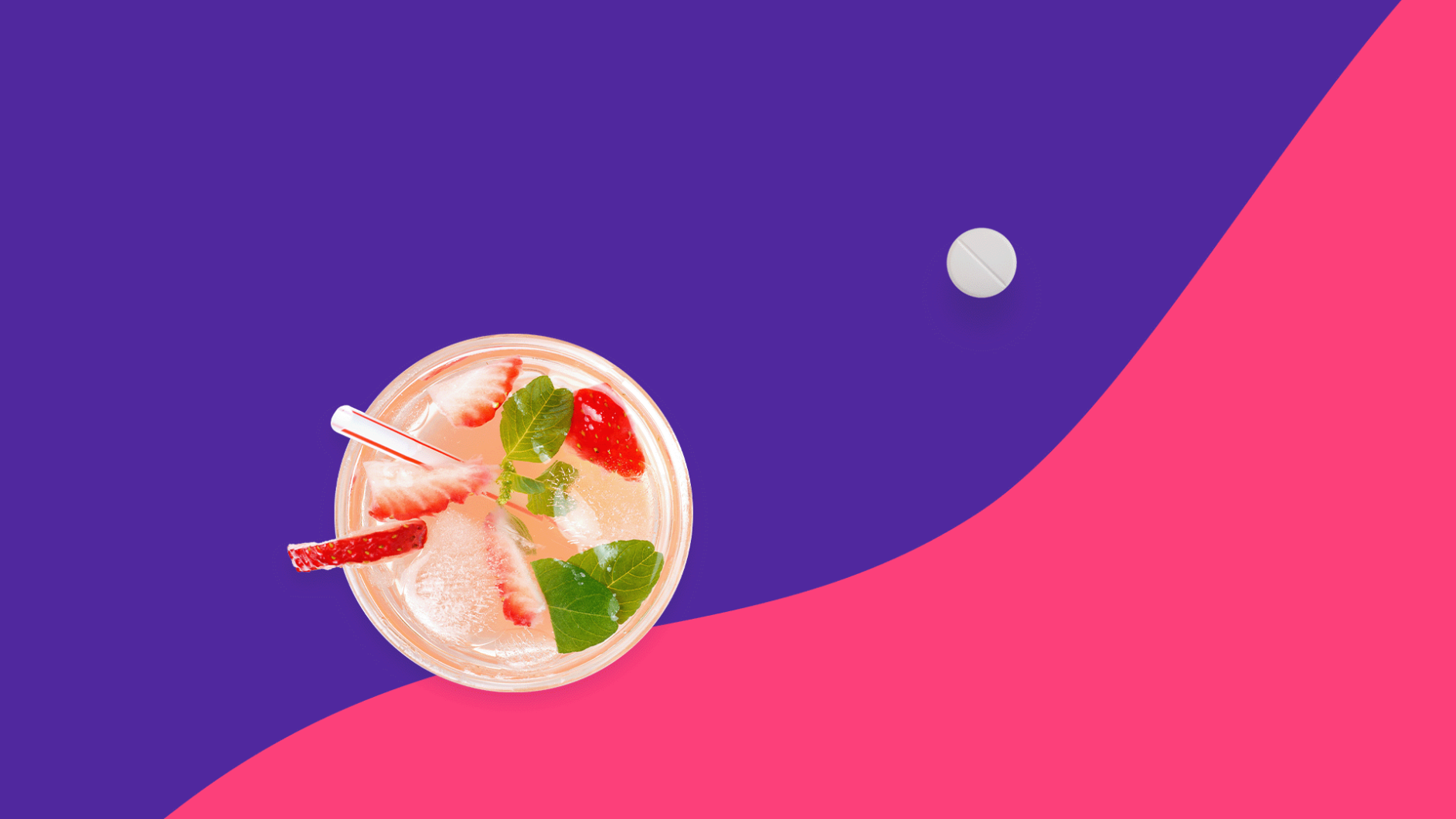Key takeaways
Mixing Ativan and alcohol is dangerous and can lead to severe side effects, including respiratory depression, coma, or death.
Ativan enhances the effects of GABA in the brain, leading to sedation and calm, but when combined with alcohol, these effects are amplified, increasing the risk of overdose.
Using Ativan for alcohol withdrawal should be done under close supervision to prevent the risks associated with mixing the two substances.
Alternatives to mixing Ativan and alcohol for treating anxiety or insomnia include therapy, lifestyle changes, or non-benzodiazepine medications, which may offer safer treatment options.
Ativan is a brand-name prescription drug used to treat anxiety and insomnia. It is commonly prescribed for the short-term relief of anxiety symptoms. However, the use of Ativan often comes with side effects like drowsiness, fatigue, and problems with coordination, which can overlap with the effects of alcohol.
If you have been prescribed Ativan, you might be wondering whether it’s safe to take Ativan with alcohol. You might also be concerned about the risk of dependence or an overdose. Whether it’s an occasional drink or long-term, heavy alcohol use, mixing Ativan and alcohol is not safe and could lead to serious side effects, such as respiratory depression, coma, or even death.
Continue reading to learn more about the effects of taking Ativan with alcohol and how to avoid the potential consequences of mixing Ativan and alcohol.
How Ativan affects the body
Ativan is a potent benzodiazepine, a class of drugs that includes Valium (diazepam), Xanax (alprazolam), and Klonopin (clonazepam). These medications work by enhancing the effects of gamma-aminobutyric acid (GABA), a neurotransmitter or chemical in the brain that slows down nerve activity. The increased activity and effects of GABA lead to central nervous system (CNS) depressant effects, such as sedation and a sense of calm.
Ativan is usually taken one to three times per day, depending on what it’s being prescribed for. For example, Ativan is typically taken at bedtime for people experiencing insomnia. If Ativan is prescribed as an anxiety medication, it might be taken two to three times per day to relieve symptoms.
Other benzodiazepines and substances that have CNS depressant effects, including alcohol, can cause similar effects as those of Ativan. Therefore, Ativan should be avoided or used with extreme caution while taking similar medications or consuming substances that have similar effects.
Can you take Ativan with alcohol?
Mixing Ativan and alcohol can lead to dangerous consequences. Although Ativan is sometimes used to treat symptoms of alcohol withdrawal, it is not recommended to consume Ativan and alcohol at the same time. Both Ativan and alcohol can slow down the CNS, leading to similar side effects.
When Ativan and alcohol are consumed together, their effects are amplified. The side effects of mixing Ativan and alcohol may include:
- Drowsiness
- Impaired motor function
- Dizziness
- Weakness
- Headache
- Confusion
- Nausea
- Memory problems
- Lowered inhibitions
- Poor decision-making
Mixing Ativan and alcohol also increases the risk of overdose, which can lead to various effects on heart rate and blood pressure. In addition, combining the two can lead to respiratory depression, in which breathing becomes shallow or stops altogether. Respiratory depression can be life-threatening and requires immediate medical attention.
In addition to the immediate dangers, mixing Ativan and alcohol can have lasting effects on mental health. Alcohol can worsen anxiety symptoms over time, which may counteract or decrease the effectiveness of Ativan. Using these substances together can also increase the risk of misuse and dependence, which may lead to a substance use disorder.
What do during an Ativan and alcohol overdose
If you or someone you know is experiencing an Ativan and alcohol overdose, seek immediate medical help. Call emergency services or go to the nearest emergency department for treatment. Symptoms of an overdose may include:
- Severe drowsiness
- Difficulty breathing
- Loss of consciousness
- Seizures
Getting the right treatment as soon as possible can help prevent life-threatening complications.
While waiting for help to arrive, try to keep the person awake and sitting upright if possible. Do not attempt to make them vomit or give them anything to eat or drink, as this may worsen the situation. You should also provide as much information as possible to the healthcare providers about the substances ingested, the amount of alcohol consumed, and any prescription drugs the person is taking.
Ativan for alcohol withdrawal
The effects of Ativan may help reduce anxiety, seizures, and muscle spasms, which are common symptoms of alcohol withdrawal. By reducing withdrawal symptoms, Ativan can help a person safely detox from alcohol and lower the risk of complications, such as seizures or the life-threatening condition delirium tremens.
Ativan is usually prescribed off-label for alcohol withdrawal under close supervision to avoid the risks of mixing Ativan and alcohol directly. If you’re struggling with alcohol withdrawal, consult a healthcare provider to determine the most effective and safe treatment option for you.
Dosage and treatment duration
The appropriate dosage and duration of Ativan treatment for alcohol withdrawal will vary depending on a person’s needs and overall medical history. The dosage may also be adjusted based on the severity of withdrawal symptoms and the person’s response to the medication.
Ativan is only recommended for short-term use for alcohol withdrawal, as prolonged use can lead to dependence and substance use disorder. When discontinuing the drug, healthcare providers may gradually lower the dosage to avoid potential Ativan withdrawal symptoms.
Ativan and hangovers
Taking Ativan (lorazepam) for an alcohol hangover is not recommended. While it may seem like it could help relieve symptoms of a hangover, such as anxiety or trouble sleeping, mixing Ativan and alcohol can be dangerous.
Since both Ativan and alcohol can be addictive, using Ativan to treat hangover symptoms can lead to an increased risk of dependence on both substances. This can potentially lead to substance abuse and worsen mental health issues or increase the risk of long-term physical health problems.
Instead of using Ativan for a hangover, it may be better to try safer alternatives, such as:
- Hydration: Alcohol is a diuretic and can lead to dehydration. Drinking water or drinks containing electrolytes can help replenish lost fluids and relieve some hangover symptoms.
- Rest: Give your body time to recover by getting enough sleep and allowing yourself to rest.
- Pain relievers: Over-the-counter pain relievers, such as ibuprofen or aspirin, may help relieve headaches and body aches from a hangover. However, avoid using acetaminophen, as it can be harmful to the liver when combined with alcohol.
- Eating a light meal: A light meal with easily digestible carbohydrates and proteins may help manage blood sugar levels and provide energy after a night of drinking alcohol.
Alternatives to Ativan with alcohol
For people seeking alternative treatment options for anxiety or sleep disorders, safer alternatives to mixing Ativan and alcohol are available. These alternatives may include natural treatments or non-benzodiazepines.
Therapy
Cognitive-behavioral therapy (CBT), dialectical behavior therapy (DBT), and other forms of therapy may help treat the root causes of anxiety and sleep disorders without relying on potentially addictive medications.
Lifestyle changes
Healthy habits, such as regular exercise, a balanced diet, and adequate sleep, may help improve overall physical and mental health. These lifestyle changes may be beneficial for relieving anxiety or hangover symptoms.
Non-benzodiazepine medications
In some cases, a healthcare provider may recommend non-benzodiazepine medications, such as selective serotonin reuptake inhibitors (SSRIs) or beta blockers, to help manage anxiety or sleep disorders. These medications may have a lower risk of severe side effects than those associated with benzodiazepines and alcohol.
Preventing Ativan and alcohol abuse
Mixing Ativan and alcohol can have serious and potentially life-threatening consequences. It can be useful to recognize the warning signs of someone who may be struggling with substance misuse.
Warning signs
Ativan and alcohol misuse may come with certain warning signs. People who mix these substances may experience the following signs or symptoms:
- Increased drowsiness and sedation
- Impaired coordination and motor skills
- Altered judgment and decision-making
- Memory loss or frequent blackouts
It’s important to note that these signs may also indicate other substance use disorders or mental health conditions, so it’s best to seek professional help for any concerns.
Supporting a loved one
If you suspect someone you care about might be mixing Ativan and alcohol, try to approach the situation with compassion and understanding. Here are some steps you could take to help:
- Have an open and non-judgmental conversation about your concerns
- Encourage them to seek professional help and discuss addiction treatment options
- Help them research and find reputable resources and treatment centers
- Offer your support and accompany them to appointments if needed
- Follow up and check in on their progress regularly
Recovery from drug addiction is a journey, and your loved one might face setbacks along the way. Your continued support and encouragement can mean the difference between success and failure in their recovery process.
Resources and treatment centers
There are several resources and treatment programs available for those struggling with Ativan and alcohol misuse. Some treatment options may include:
- SAMHSA’s National Helpline: A free, confidential helpline providing information and referrals for substance abuse and mental health treatment
- Outpatient counseling and therapy: For people experiencing mild symptoms or who require more flexibility in their treatment schedule
- Inpatient rehabilitation: Intensive, residential programs for those with more severe substance use disorder or co-occurring mental health conditions
- Support groups and peer recovery networks: Community-based organizations that provide support and encouragement for those in recovery
Each person’s treatment needs may differ. You can research and find the right options tailored to you or your loved one’s situation.
Bottom line: Mixing Ativan and alcohol is not safe
Ativan can be an effective treatment option for managing anxiety, insomnia, alcohol withdrawal symptoms, and other conditions. However, it should only be used as prescribed by a healthcare professional. Taking Ativan with alcohol can increase the risk of severe side effects and long-term health problems.
Alternative treatments for anxiety or insomnia, such as therapy or non-benzodiazepine medications, may be potential options for people at risk of mixing Ativan and alcohol. Treatment options and other forms of support are also available for people who are struggling with Ativan and alcohol misuse.



